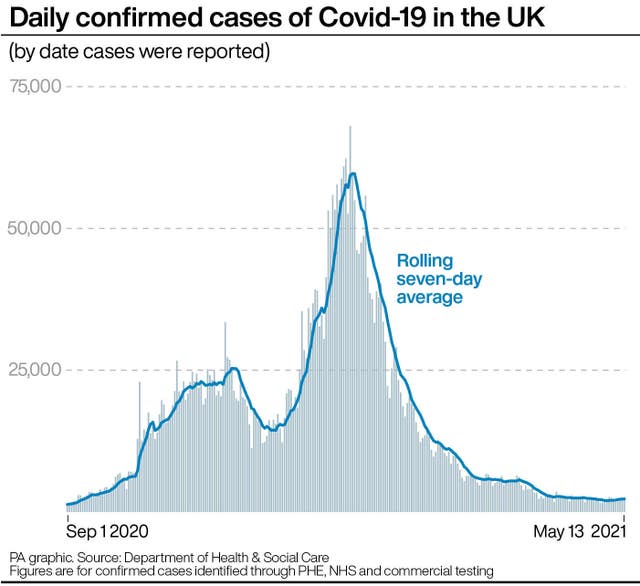Scotland seeing ‘loss of control’ of pandemic in some areas – expert
There are concerns about the spread of one of the new Indian variants of coronavirus.

Scotland is seeing a “loss of control” of the pandemic in some areas and it is premature to lift restrictions, an epidemiologist has warned.
Dr Deepti Gurdasani said action must be taken to prevent the situation worsening amid concerns about the spread of one of the new Indian variants of the virus north of the border.
Public health experts have warned that a spike in coronavirus infections in Glasgow could include the so-called B.1.617.2 variant.
First Minister Nicola Sturgeon has said the situation in Glasgow is being monitored “very closely”, with cases in the city at 70.9 per 100,000 people in the seven days to May 10, according to latest data on Thursday.
Moray currently has the highest rate in Scotland at 98.1 cases per 100,000 and is unlikely to join the rest of the country by dropping down a level under the Scottish Government’s five-tier system as restrictions ease on Monday.
Dr Gurdasani, a clinical epidemiologist and senior lecturer at Queen Mary University of London, said lifting restrictions is premature.
She told BBC Radio Scotland’s Good Morning Scotland programme: “The idea is certainly premature, in fact the Government should be considering the opposite.
“In Scotland as a whole we’ve actually seen the number of new cases double in the last week, and while the cases are so low it’s hard to see exponential rises.
“This is what early exponential rises look like and we’re seeing loss of control of the pandemic in many parts of Scotland, and the situation is likely much wider and other places will follow unless action is taken to actually prevent this and pre-empt this now.”

She said the arrival of new variants in the UK is not inevitable and is a result of a “failed border policy”, pointing out that areas which have had comprehensive border restrictions such as Australia, New Zealand, Hong Kong and South East Asia have not imported many of these concerning variants.
The coronavirus variant B.1.617.2, first identified in India, has been designated as a “variant of concern” by Public Health England because it is thought to be at least as transmissible as the variant detected in Kent last year, known as B117, which is now dominant in the UK.
Dr Gurdasani said it is too early to say whether it will lead to an increase in hospital admissions.
She said: “Given there’s always a lag between when infections rise and hospitalisations rise, I would have expected to see a rise in hospitalisations at this point in time so so it’s hard to make inferences from that.
“Also, we need to remember in England this variant is growing among young people right now, and this is the same pattern as we saw with the Kent variant where first the growth happens in school-age children and young adults then spreads into older age groups.
“If you look at cases in older age groups they’re quite flat at this point in time, so we’re not really seeing infections in those groups and that might be a vaccine effect or it might just be an effect of lower mixing, we don’t know yet.”
A Scottish Government spokesman said: “We’ve been clear since the beginning of the pandemic that we will continue to follow scientific advice.
“Our plans for careful unlocking take account of the improved situation, while also acknowledging the risks we still face.
“While we intend to take the next steps as a nation together where possible, we stand ready to deploy the revised levels at a more local level if necessary – if prevalence of the virus surges in some parts of Scotland but not others.”





